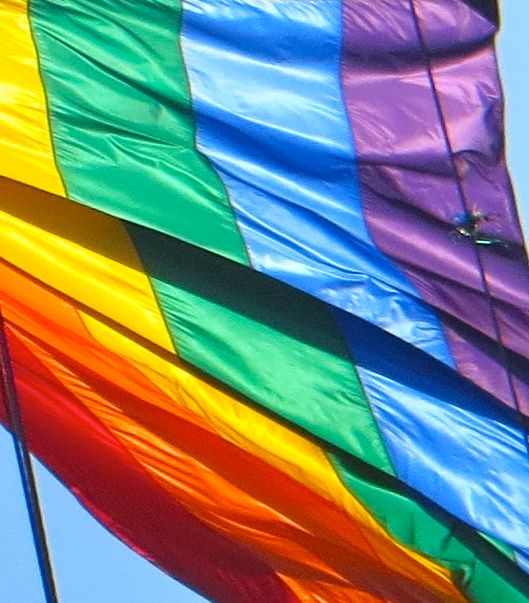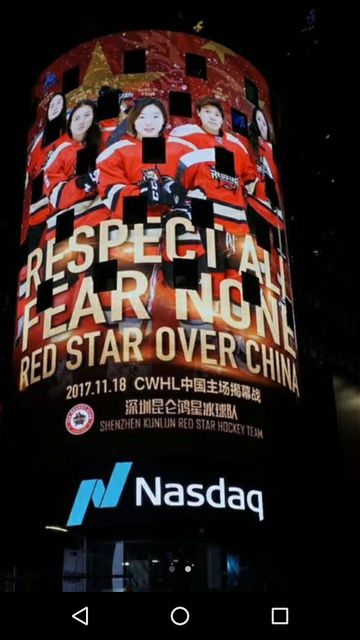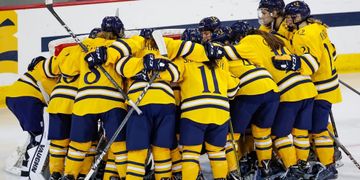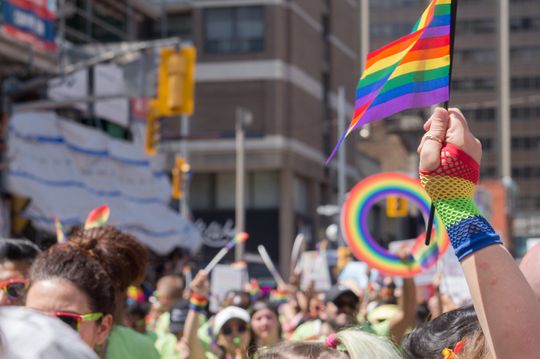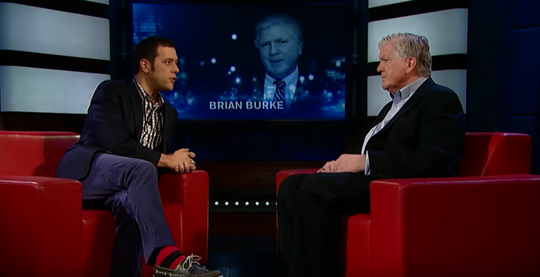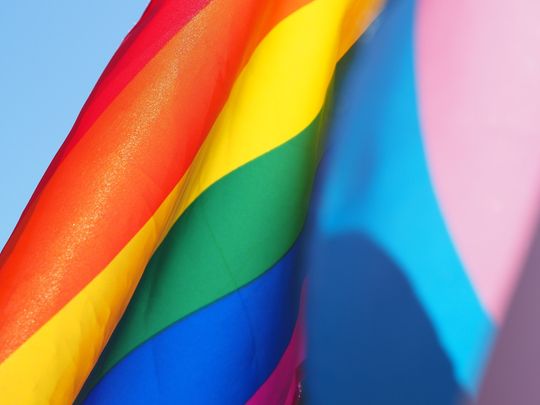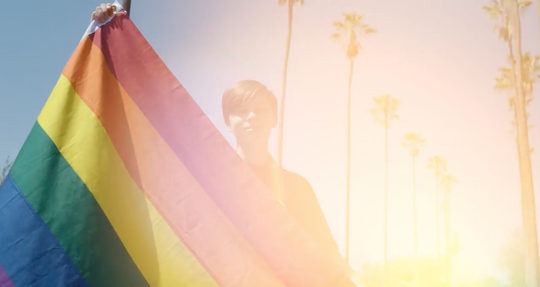We talk a lot about queer acceptance and advocacy in sports, but the sports world currently requires athletes and fans to assimilate. Queer athletes, whether they are publicly out or not, are often obliged to adhere to the cultural norms of their respective sports if they wish to play. These norms are created and maintained for the benefit of cis, straight athletes. Sports have not changed to accommodate the queer player; instead, it's the queer athlete who must always adapt to the hostile and dangerous environment of a sporting culture that's been designed for the comfort of others. The cishet athlete has historically been invested in keeping sport free of queer culture, and this extends from the playing field to the stands. Non-queer fans are similarly invested in keeping queer supporters out of stadiums and arenas. Non-queer fans weaponize the hypermasculine and heteronormative aspects of sporting cultures to make sports fandom all but inaccessible to their queer counterparts. North American LGBTQ advocacy groups, like Athlete Ally and You Can Play (YCP), exist to make the sports landscape more inclusive -- and yet, this advocacy model brings its own problems. Far too often, queer advocacy in sports is actually an argument for queer assimilation, and in pro sports like hockey, the specter of queer and trans inclusion is often a boilerplate statement, draped in rainbows, that is intended to obscure a true lack of action.
Advocacy to improve these conditions often centres non-queer "allies." Queer athletes and fans often lack visibility, so non-queer LGBTQ allies have taken a leadership role in regards to queer inclusion in men's pro sports. Unfortunately, this ignores the publicly out queer pioneers who have rarely been empowered to shift discourse in men's professional sports because they were queer, because they were women, because they were athletes of colour. This disempowerment is significantly magnified for queer fans. The result is a lack of space and public attention for queer athletes and fans to advocate for our needs on our terms. But queer athletes and fans persist in their love of the game as participants who are invisible, erased, and ignored.
The fact that queer issues have gained some traction in the sports world in the past few years should not be understood as a sign that sports (and particularly the hypermasculine culture of sports like men's hockey) are becoming more queer inclusive. Rather this traction is a sign that the inclusion of queer athletes and fans has been wrapped in a more appealing package to non-queer decision makers in sports and to non-queer fans. This culture is not limited to men's hockey. Despite a number of publicly out queer athletes in the game, women's hockey culture is still persistently heteronormative. Women's pro leagues and national federations frequently emphasize the role that women's hockey players perform as role models and the importance of growing the game, both goals that are often directed at children. Emphasizing the heteronormative aspects of women's hockey culture serves to both erase queer athletes and cement the women's game as "family-friendly" for queerphobic and transphobic hockey fans. All of this combines to make the general culture of hockey extremely binary, transphobic, and queerphobic.
Cishet allies working with queer advocacy groups are presented as more palatable spokespeople to non-queer decision makers, players, and fans. Queer athletes and fans are often marginalized when they're told they're too disruptive, controversial, and impatient, and are not placed in leadership positions in sports. When queer athletes and fans are not empowered, their own leadership and advocacy efforts are ignored. This allows for cishet allies and advocacy groups to share convenient and conventional queer narratives that emphasize the commonalties between queer and non-queer athletes and fans. Rather than challenge the homophobic, biphobic, and transphobic aspects of sporting culture, these narratives can be absorbed by the mainstream, and limited queer assimilation can be accepted.
In both Canada and the United States, queer advocacy is currently hampered by the intentions and demands of non-queer "allies." Non-queer advocates take up considerable space in organizations, committees, and groups who are allegedly working toward queer inclusion. The two most prominent queer advocacy groups in sports, Athlete Ally and You Can Play, were created by cis, straight men. The mandates of these organizations were developed and initially implemented by cis, straight men. While the executive boards and advisory committees of each organization have since diversified and include a handful of prominent and important queer activists, non-queer voices still hold considerable power.
Much of the messaging from both Athlete Ally and YCP emphasizes the importance of the non-queer ally in the fight for queer inclusion in sports. Hudson Taylor, Athlete Ally's founder and executive director, is described as a "prominent straight ally" on the organization's website. Athlete Ally's mission is queer acceptance through allyship, regardless of sexuality or gender identity, rather than through exclusively emphasizing and magnifying queer voices. Athlete Ally's mission statement proclaims, "it's not just about who you are or who you like, it's about what you stand for." But who we are and who we like as queer and trans athletes and fans does matter. Rather than weaponize our queer identities against us, this type of allyship model minimizes and erases who we are as queers to achieve a united front with cishet allies. While emphasizing queer voices challenges the culture of men's and women's sports, promoting allyship emphasizes the cishet athlete's or fan's graciousness and decency. It ignores queer activism and valourizes non-queer action.
While YCP has added significant queer leadership to its staff and board, non-queer voices are often chosen to represent the organization. This is especially true in hockey, where co-founder and former president Patrick Burke and advisory board member Brian Burke have typically represented YCP at hockey outreach events. While Patrick Burke retired from the organization early this year, his father continues to represent the group, as was the case recently when the Brian Burke spoke at a YCP event. However, the Burkes aren't queer. They are established and powerful cishet men in the NHL whose experience of queerphobia is secondhand. While their effort has been longstanding and their intentions are good, their advocacy reflects a lifetime of working in the men's game as straight and cis men. They neither challenge the toxic masculinity that underpins the queerphobia in men's pro hockey (in fact, Brian often celebrates it) nor are they equipped to do so, because of their experience in the game. Their connections to and defense of men's hockey culture means that the queer inclusion they advocate is limited in scope and assimilative at its heart. When ally advocates talk about wanting homophobic slurs to end, but celebrate the "truculence" of the game, they do not understand how the game's hypermasculinity generates and maintains that same homophobia.
Because of their important connections to both the NHL and the YCP organization, the Burkes have become an easy pivot for queer inclusion soundbites and quotes for mainstream hockey journalists. This is not entirely the fault of the Burkes; journalists who cover the NHL for major news organizations refuse to do their due diligence when it comes to queer inclusion, and rely on the tired trope of the cishet ally expert for their stories. Those covering queer inclusion in the NHL never actually have to talk to actual queer people and never have to change their own problematic behaviours to include queer people because the ally is, incorrectly, considered to be qualified to speak for the queer community.
At their core, Athlete Ally and YCP reflect an understanding of allyship that promotes the status quo and articulate mandates of assimilation, not inclusion.
"If you can play, you can play" is an appropriate slogan for YCP, because it illustrates the organization's limited mandate. The slogan frames queerphobia in sports as a question of merit while limiting the discussion of inclusion to a given athlete's talent. However, homophobia, biphobia, and transphobia in sports has never actually been an issue of ability. Queer athletes have won championships and Olympic titles in women's and men's sports; that they did so while not publicly out had little to do with their proven ability and more to do with the overwhelmingly and persistently queerphobic cultures of so many sports. Trans and nonbinary athletes are often prevented from competing, not because of their talent, but because of archaic regulations. Queer athletes know their own abilities, while what remains unclear is the character of non-queer athletes and fans in sport.
YCP's slogan promotes advocacy without challenging a discriminatory culture. Such advocacy doesn't promote inclusion, but rather assimilation. Queer assimilation will not result in the free participation of queer athletes because assimilation leaves in place the racist, hypermasculine, homophobic, and transphobic culture of sports like hockey. This is by design. Queer "allies" like Brian and Patrick Burke, defend the hypermasculine aspects of hockey. The hypermasculinity that they endorse promotes physical violence (indeed, a violent type of retribution) and pivots on an implicit understanding by those in the game that weakness, figured as feminine (both women and gay men), is negative and bad. The "character values" prized in the world of men's hockey are values that are undermined and disrupted if all queer players and fans are truly welcome in the game.
The YCP slogan also limits the scope of queerphobia in sports. Queer discrimination in sport is not limited to things that happen on the ice or playing field, nor is it limited to the experience of professional queer athletes. Professional leagues have long ignored the experiences of queer fans attending games in person, watching in public, or participating at a recreational level, and are less of a priority for ally organizations. But prioritizing queer fan inclusion requires clear challenges to established fan and sporting cultures. So far, queer advocacy groups are unwilling to do this work. While Athlete Ally stands with queer folks on social and political issues, such as opposition to transphobic bathroom bills and petitioning the NCAA to refuse to hold tournaments in states discriminating LGBTQ people, YCP cannot even match this base level of political action. YCP has only offered a few tepid tweets against transphobic bathroom bills in North Carolina and Texas and was neutral on marriage equality in the United States. Organizations that are queer run, which elevate and magnify queer voices, do not remain neutral while queer rights are debated and queer lives are jeopardized.
Too often "If you can play, you can play" means "get on with the game." When pro athletes make homophobic remarks or use homophobic slurs, YCP is called upon to shield the athlete, teams, and leagues from additional criticism. When Andrew Shaw yelled at a referee, calling him a faggot, in a 2016 NHL game, YCP issued a statement condemning Shaw and applauding the one-game suspension he received. But the statement also emphasized YCP's hockey relationships and its desire to work with athletes like Shaw: "After four years of working with You Can Play, NHL players can no longer use ignorance as an excuse for not understanding the power of their words and the effect they have on their teammates, fans, and the LGBT community. We look forward to continuing our partnership with the NHL, the Blackhawks, and Mr. Shaw as we work to finally eradicate homophobia in hockey culture."
The NHL's persistent, ingrained, and often celebrated homophobia never jeopardizes YCP's relationship with the league. When serious acts of homophobia occur, YCP uses them as an opportunity to pivot to a conventional redemption arc. In Shaw's case, this played out the following year when he was named Montreal's You Can Play Ambassador. The honour was about showcasing Shaw and his development and evolution, not about queer safety and inclusion. YCP frequently highlights Brayden Holtby's queer allyship, but has never acknowledged his transphobia. That Shaw appeared to use the same slur in a similar situation last month should make us question the nature of YCP intervention when a situation like this occurs.
What conversations happen between YCP reps and players when athletes use slurs? What do bigoted athletes do to convince organizations like YCP that they understand why their homophobia was wrong? Why does an athlete's transphobia never require a discussion with YCP? While it's possible something substantial occurs behind closed doors, what it looks like publicly, especially to queer fans, is damage control that's designed to most benefit the offending athlete. An athlete gets caught demonstrating overt homophobia on camera, YCP might tweet a short condemnation, the player publicly apologizes, donates a small amount of money to YCP, and is once again someone we can cheer for -- now complete with the YCP queer seal of approval. This approach is simply not working; it doesn't change the culture because it keeps happening, over and over and over again.
There is a role for queer advocacy groups in sports. Athlete Ally and YCP seem particularly adept at providing resources and assistance to college and pro queer athletes who wish to publicly come out. Make no mistake that is a vital service. Prominent queer athletes risk much when they publicly come out and should have the support and resources they need to make that decision in a way that works for them. But neither organization prioritizes cultural change nor addresses the toxic masculinity of many sports environments. We need queer advocacy groups that are run by queer folks, who tackle these issues, who recognize the challenges facing queer fans, and who demand true queer inclusion, not queer assimilation.
(Photo: torbakhopper/Flickr)
